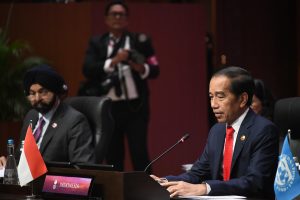With major crises in Gaza and Ukraine, the Biden administration might be tempted to overlook the importance of Indonesian President Joko “Jokowi” Widodo’s mid-November visit to Washington. That would be a mistake. Indonesia is an important country that is heading into crucial presidential elections in early 2024, and the results of Jokowi’s visit could go a long way to shaping the next Indonesian government’s attitudes toward its relations with the United States.
Although U.S.-Indonesian security cooperation is good and trade has grown, by all accounts Jokowi and his team are heading to Washington feeling less than satisfied on several fronts. First, Indonesians remain upset by President Joe Biden’s decision to skip the recent Indonesia-hosted East Asia Summit, which they took as a serious snub. Biden invited Jokowi in part to make up for that absence, but the White House might have underestimated the extent to which Indonesians remain upset over the initial affront. The protocol-conscious government no doubt will also contrast their modest White House schedule with the lavish welcome recently received by Australian Prime Minster Anthony Albanese.
Indonesian authorities also remain unhappy with what they see as Washington’s failure to deliver on the high-profile Just Energy Transition Partnership (JETP), under which the U.S. committed to lead G-7-plus efforts to mobilize $20 billion to support Indonesia’s accelerated transition from coal to cleaner energy. Indonesian officials have complained publicly for months that the U.S. has pressed them to take difficult steps while offering little in the way of concessional financing to pay for it. The reality is more complicated, but the perception in Jakarta that Washington “sold them a bill of goods” is real. Some Indonesian officials have contrasted that with substantial Chinese funding on priority infrastructure initiatives, highlighting the regional perception of U.S. weakness vis-à-vis China as a reliable economic partner. (The Indonesians have largely ignored the fact that the U.S. is their second-largest export market and has risen rapidly to be their fourth-largest source of foreign direct investment.)
Jokowi also is looking for Biden to move forward on a proposed limited free trade agreement under which Indonesian critical minerals (namely nickel and processed nickel) would meet the criteria for inclusion in the electric vehicle tax credits provided for in the Inflation Reduction Act. The Biden administration reportedly is interested in such a deal, which by promoting diversification of both suppliers for the U.S. and markets for Indonesia would be in the U.S. national interest. It has, however, hesitated to proceed due to concerns about the congressional reaction, environmental and labor issues, and heavy Chinese investment in Indonesian nickel mining.
Finally, one has to assume that the Gaza crisis will be at the top of Jokowi’s agenda (if not Biden’s) when the two presidents meet. Indonesia, home to the world’s largest Muslim population, has long supported the Palestinian cause and has vigorously pursued diplomatic efforts to achieve an immediate ceasefire. While working hard to keep the issue from blowing up domestically, there is no question but that Indonesian public opinion (and genuinely held beliefs among top officials) has put the two governments at odds over the crisis.
At this late date, there is little prospect of major initiatives coming out of the Biden-Jokowi meeting that would ease Indonesian concerns or generate significant positive momentum. There is, however, still time to make some small investments that could result in Jokowi and his team leaving Washington feeling more positive about the relationship.
First, on Gaza, the meeting will not resolve the two countries’ differences, but it is important that Biden listen to and engage with Jokowi seriously on the issue and that he highlights his efforts to encourage Israel to show restraint and to promote a humanitarian pause. Jokowi’s post-meeting public comments about this discussion likely will have a significant influence on the Indonesian public and media perceptions of the U.S. role, so it is critical that Biden do all he can to ensure those comments are positive.
Second, it is important that Biden understand that Jokowi and many Indonesians are still upset over the president’s decision to skip the recent Jakarta summit. Biden cannot undo that, but he can and should acknowledge it in his discussion with Jokowi and emphasize that he appreciates how important Indonesia is.
Even such moves will only go so far without some movement on JETP and the critical minerals trade question. On the former, there isn’t time to achieve major progress before the meeting, but President Biden should instruct his team to redouble their efforts to mobilize funding and get the initiative moving. This goes beyond Indonesian concerns and gets to the heart of regional wariness about Washington being able to put meat on the bones of its various economic initiatives.
On critical minerals, Biden should agree to send trade officials to Jakarta to discuss the outlines of a possible agreement, though he will have to be careful not to overcommit absent confidence he will be able to deliver. Indonesia, for its part, needs to stop rotating ambassadors through Washington so quickly and install an envoy who can effectively make the case for a limited trade deal to Congress and others.
Some serious, last-minute work needs to be done to ensure that next week’s meeting between the leaders of the world’s second and third-largest democracies does more than highlight the differences and problems in the relationship.

































